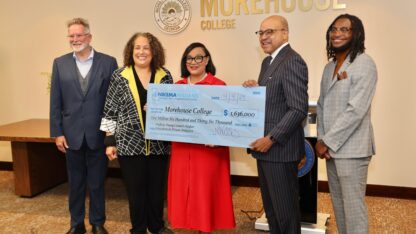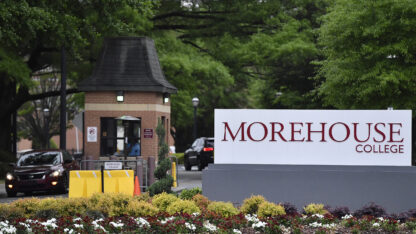Morehouse College partners with debtors union to spark national conversation about student debt

Joshua Elon Brown owed Morehouse College about $18,000.
That was until he checked his student portal one day this past October. He logged in like normal, but the balance was cleared. It was a miracle.
“I just broke out into tears,” Brown said. “I literally was just like, ‘Thank you God, this is all I ever wanted.’”
The payment in his account was credited to the “Rolling Jubilee” — the debt abolition fund for an organization called The Debt Collective.
The Collective had bought Brown’s past-due account balance and wiped it clean. They did the same for nearly 3,000 Morehouse students and alumni this fall.
This was not the school’s first gift of this kind. In 2019, billionaire Robert Smith pledged about $34 million to eliminate the loan debt for Morehouse’s graduates that year.
“This is my class, 2019,” he stated to the young men dawned in cap and gown. “And my family is making a grant to eliminate their student loans.”
As the weight of Smith’s gift and the implications of living debt-free settled over the crowd, enthusiastic applause grew to an exalted ovation.
“MVP! MVP!” the graduates cheered from their seats.
Smith’s private act of philanthropy had given Morehouse a platform.
For Andrew Douglas, a professor of political science at Morehouse, that platform offered an opportunity.
“That really is the catalyst for the development of my class,” Douglas said. “We really needed to develop some curriculum connected to this so that we could build and sustain a movement of educated students who could really develop some critical analysis of debt crises of various sorts.”
“Part of that class entailed learning a lot about the Debt Collective,” he continued. “That led to a relationship with some of the organizers at the Debt Collective, and one thing led to another, and they floated the idea of bringing their debt relief efforts to Morehouse.”
After years of collaboration, the Morehouse “debt-buy” came to fruition this fall. The college sold nearly $10 million of past-due account balances to the Collective for $125,000 of its Rolling Jubilee Fund.
According to Braxton Brewington with the Debt Collective, the Jubilee pre-dates the Collective. It was born when activists with Occupy Wall Street saw debt as something that tied the movements together.

“There was a thinking of, ‘Well, debt is sold on this shady, predatory market. Why can’t we, normal people, act as a debt collector and then cancel this debt,’” he said.
The fund’s name drew inspiration from the Biblical tradition.
“The Jubilee is this sort of moral re-ordering of society,” Brewington added. “It was a time for land to be returned to owners. It was a time for slaves to be set free. It was a time for debts to be canceled.”
Over the years, the Collective and their Jubilee have funded a number of “debt-buys,” including relief for other HCBUs. Last year, they forgave about $1.7 million for students and alumni of Bennett College, an HBCU for women in South Carolina.
But the gift only applied to student account balances — it did not touch any form of federal or secondary private loans. The same is true for Morehouse.
“We can’t cancel federal student debt because that’s held by the federal government,” according to Brewington. “But the federal government can cancel that because they own the debt.”
Brewington said actions like this are meant to send a message, especially to the White House.

The Biden administration put forth a significant forgiveness plan earlier this year, but the Supreme Court struck it down.
The forgiveness was also not explicitly targeted at HBCU alumni. One of the President’s campaign promises was to cancel federal student loan debt for all HBCU students, public and private.
Jalil Bishop is the co-founder of the Equity Research Cooperative. He also consults the Department of Education and credits groups like the Debt Collective for setting the pace on student debt relief.
“We really wouldn’t be having a conversation around what does it mean to cancel debt if it wasn’t for activist movements,” he said.
It is no shock to him that activist organizations have partnered with HBCUs as they continue their advocacy.
“I think that they are leading the way in correcting something that should not have been happening over the last 20-30 years. What real justice looks like in this situation is those institutions following their mission: to be an engine of mobility, not to be an engine of debt traps.”
Jalil Bishop, co-founder of the Equity Research Cooperative
Bishop also said that the influence of actions like Morehouse’s debt relief is more than symbolic.
According to him, the first instance of mass debt forgiveness from the Department of Education happened when people who owed money to for-profit colleges organized and worked alongside the Debt Collective.
“Federal policy and activist movements are intertwined; it is because of those movements that the conversation has shifted around student debt.“
Jalil Bishop, co-founder of the Equity Research Cooperative
Though one-off debt forgiveness at Morehouse does not fix the student debt crisis nationwide, Bishop said it sets a powerful precedent.
The Collective’s gift also had a tangible impact on 3,000 Black men — Joshua Elon Brown among them. The $18,000 that he owed Morehouse was dragging him down.
“Whatever metaphor you wanna use. The biggest elephant in the room, the biggest cloud over your head … I was essentially stuck with that,” he said.
The Biden administration is looking into more options for mass debt forgiveness.
But with the fall resumption of federal student loan payments, over 1.6 million Georgians are still figuring out what that means for them.
Georgia is third in the nation for average student debt per borrower, with the average borrower in the state owing nearly $42,000.








